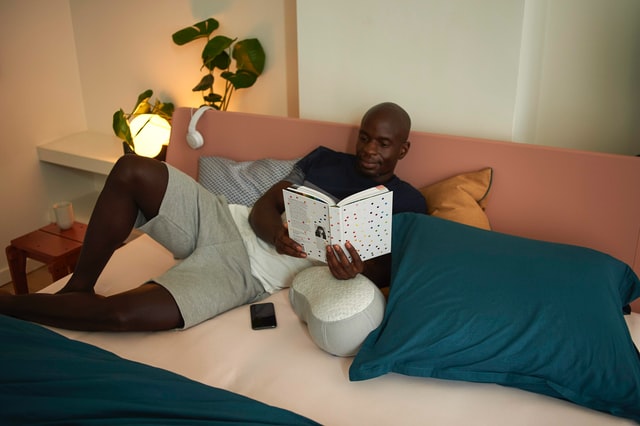Photo by Somnox Sleep on Unsplash
WHY YOU FEEL SLEEPY DURING DAY AND SLEEPLESS AT NIGHT
Do you always have problems sleeping at night but find yourself always feeling sleepy during the day?
A good number of people can relate to this problem including myself because I have always been a chronic nightwalker.
At first, it could seem intentional but the moment it becomes a part of you, you find yourself finding it difficult to normalize your sleep pattern.
And at some point or the other, you might want to when it begins to probably affect you and some of your daily activities.
If you are reading this, then it’s obvious you fall in this category and you are wondering the major reason for your energy at night and zero energy during the day.
Well, based on I’ve been this way for the longest time, it felt natural, making me feel- this is probably just how I am.
Could this be how I naturally am or could I have made myself this way?… Out of curiosity, I went ahead to do some research and I found something interesting
MAJOR CAUSE OF YOUR ABNORMAL SLEEP ROUTINE
There are different reasons as to why you feel sleepy and unenergized during the day but sleepless and energized at night.
Especially when it is not exactly a routine of yours, but when it is or has become one, the major reason would be a circadian rhythm abnormality.
People often develop this condition in their mid to late teenage years, though it can also be genetic.
Dr Meir Kryger, MD, an expert in sleep disorders at Yale Medicine, says that
being tired in the daytime and energetic at night is usually caused by circadian rhythm abnormalities
This would probably sound foreign to many but not to all. For those who have heard of it- great! For those who haven’t- Well let’s briefly go over it.
CIRCADIAN RHYTHM ABNORMALITY
There is something called the circadian clock in our brain, which drives daily behavioural and physiological rhythms.
This circadian clock could be synchronized with real local time. On the other hand, it might not be synchronized for some others.
When this circadian clock in the brain is not synchronized with ‘real’ local time clock. It can result in abnormal sleep patterns, sleep loss and fatigue.
An alternative name for this condition is called advanced sleep phase disorder; delayed sleep phase disorder; non-24-hour sleep/wake syndrome; free-running sleep/wake patterns.
CIRCADIAN RHYTHM SLEEP DISORDER
A circadian rhythm is a natural, internal process that regulates the sleep-wake cycle and repeats on each rotation of the Earth roughly every 24 hours.
These 24-hour rhythms are driven by the circadian clock mentioned earlier and the abnormality of this leads to the circadian rhythm sleep disorder.
Having a circadian rhythm sleep disorder is similar to having permanent jet lag – a misalignment between the body clock, the local clock time and the light/dark cycle.
This leads to problems in falling asleep when we want to, staying asleep and feeling fully rested, and also feeling sleepy during waking hours.
So to be able to get good quality sleep at night requires that our circadian clock is appropriately synchronised with local time.
WHAT ALTERS THE CIRCADIAN CLOCK?
- Not getting enough sleep or not sleeping at all withing a 24hrs time frame could alter your circadian clock somehow
- Sleeping too much or way more than required especially at the wrong time within 24hrs time frame can also cause this
There are various reasons that could make this happen. Some of which I would be highlighting below
OTHER CAUSES OF ABNORMAL SLEEP PATTERN
Poor sleep schedule
This has to do with not being consistent with a particular sleep schedule or being consistent with the wrong schedule.
Constantly staying awake when you should be asleep and constantly sleeping when you should be awake are all parts of this poor sleeping schedule, till it becomes a habit.
Not surprisingly, the problem of daytime sleepiness usually starts at night. Even missing just a few nights’ sleep, or not getting enough uninterrupted sleep, can slow you down and sour your mood.
Daily work schedule
Your daily work schedule can also be part of the reason for your poor sleep schedule.
Often times, the time that we go to bed and wake up is generally determined by our work, study and social commitments.
Some people who work night shifts or do things that require them being awake at night could be the reason for their own circadian clock alteration.
This is sometimes beyond our control, all we can do is take advantage of it if adjusting our schedule is not in our hands.
Adrenal dysfunction
An adrenal dysfunction that creates too much cortisol can also make it harder to fall asleep.
Our adrenal glands pump out cortisol and our cortisol levels are “supposed to be the highest in the morning and then slowly go down by the end of the night.”
However, in individuals with adrenal dysfunction, or experiencing stress, cortisol levels do not taper off at night.
When cortisol is high melatonin should be low, and when melatonin is high cortisol should be low
Carolyn Dean elaborates.
Melatonin is the hormone that regulates sleep-wake cycles,
So, if someone has higher stress-induced cortisol levels all day and it doesn’t diminish in the evening, then melatonin is blocked and the body feels revved up with cortisol
according to Dr Dean.
This irregular cortisol levels can be tested with a saliva or urine test and a dose of hydrocortisone can often solve this issue.
If you find this article helpful, kindly leave your comments below and don’t forget to share

[…] CIRCADIAN RHYTHM SLEEP DISORDER | REASONS FOR SLEEPLESS NIGHTS […]